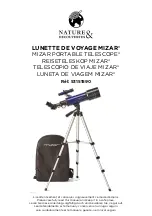
2. Place the base of the equatorial mount onto the tripod
head. Orient the equatorial mount so that the post on the
tripod head lines up between the azimuth adjustment
knobs on the equatorial mount (Figure 2). You may need to
loosen the azimuth adjustment knobs on the equatorial
mount in order to fit the mount into the tripod head.
3. Thread the central support shaft into the equatorial mount
until tight. This will secure the equatorial mount to the tri-
pod head.
4. Remove the knob and washer from the bottom of the cen-
ter support shaft. Slide the tripod support tray up the bot-
tom of the central support shaft until the three tray arms
are touching the legs of the tripod. The flat side of the
accessory tray should be facing up. Make sure the “V” of
each tray arm is against a tripod leg. Place the washer
back on the center support shaft against the tray, and
thread the securing knob all the way up the center support
shaft until it is tight against the tray. The tripod support tray
provides additional stability for the tripod, and holds five
1.25" eyepieces and two 2" eyepieces.
5. Thread the latitude adjustment L-bolt into the rear of the
equatorial mount as show in Figure 1
6. Thread the counterweight shaft into the equatorial mount
at the base of the declination axis until tight. Make sure the
casting at the top is threaded clockwise as far as it will go
before attaching the shaft. Once the shaft is installed, turn
the casting counter-clockwise until the top of the casting is
flush with the mount.
7. Remove the knurled “toe saver” retaining screw on the bot-
tom of the counterweight shaft and slide both counter-
weights onto the shaft. Make sure the counterweight lock
knobs are adequately loosened to allow the counterweight
shaft to pass through the hole. Position the counterweights
about halfway up the shaft and tighten the lock knobs.
Replace the toe saver at the end of the bar. The toe saver
prevents the counterweights from falling on your foot if the
lock knobs happen to come loose.
8. Attach the slow-motion control knobs to the right ascen-
sion and declination worm gear shafts of the equatorial
mount by sliding them onto the shafts. Line up the flat on
the end of the shaft with the corresponding feature on the
interior of the knob to attach them properly. The knobs can
be attached to either end of the shafts; use whichever end
is most convenient.
9. Loosen the black mounting plate securing knob as well as
the metal safety screw on the top of the equatorial mount.
Place the tube ring mounting plate, with the tube rings
attached, in the dovetail slot on top of the equatorial
mount. Position the mounting plate so that it is centered on
the dovetail slot. Re-tighten the mounting plate securing
knob until the mounting plate is secure. Then, tighten the
safety screw. The safety screw will ensure that the mount-
ing plate (and telescope tube) will not fall off the EQ mount
if the mounting plate securing knob should come loose.
10. Open the tube rings and lay the telescope optical tube in
the rings at about the midpoint of the tube’s length. Rotate
Figure 2.
Orient the equatorial mount so that the post on the
tripod head lines up between the azimuth adjustment knobs on the
equatorial mount.
4
Post
Azimuth
adjustment
knobs
Finder scope
Finder scope bracket
Nylon
alignment
thumbscrews
Focus lock ring
Figure 3b.
Pull back on
the tensioner and slide the
finder scope into its bracket
until the O-ring is seated in
the bracket ring.
Figure 3a.
The 6x30 finder scope.
Tensioner



























